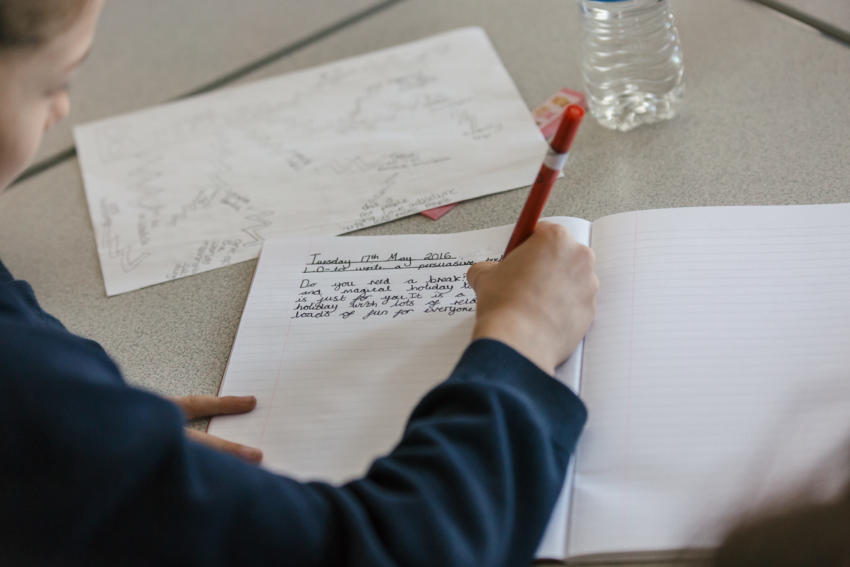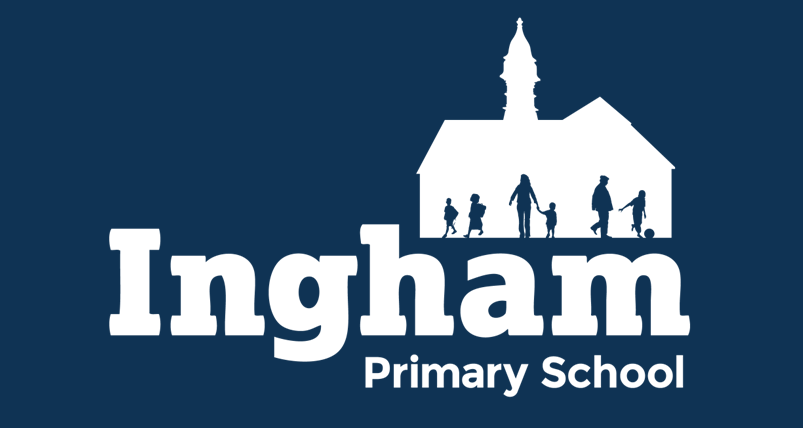English
So how does our Curriculum Vision become a reality? Find out about the teaching of English at our school here.
Reading
 Intent
Intent
At Ingham Primary School, we believe that all pupils should have the opportunity to be fluent, confident readers who are able to successfully comprehend and understand a wide range of texts. We want pupils to develop a lifelong love of reading, a good knowledge of a range of authors and be able to understand more about themselves and the world in which they live through the knowledge they gain from texts. By the end of their time at primary school, all children should be able to read fluently and with confidence, in any subject, in preparation for secondary education.
We do not put ceilings on what pupils can achieve in reading and we do not hold pre-conceptions about any pupils’ ability to make progress; instead, through high quality teaching, we want every child to become a reader regardless of any other barriers to their learning. We understand the importance of parents and carers in supporting their children to develop both word reading and comprehension skills, and so we want to encourage a home-school partnership which enables parents and carers to understand how to enhance the skills being taught in school through good quality texts.
Implementation
Classroom organisation: We teach reading skills as a whole class lesson so that all children have access to aspirational texts that support writing composition and the age-related skills and knowledge contained in the National Curriculum. Text types are carefully planned to ensure pupils are exposed to a wide variety of contemporary and classic fiction. Non-fiction is selected from a variety of sources. Children are taught to use various strategies to develop their reading: summarising, predicting, retrieving, clarifying vocabulary and inference.
Texts are pitched slightly above the child’s independent reading ability. Teachers and teaching assistants model reading the text fluently, unpicking key vocabulary, grammar and the overall effect on the reader. Teachers and teaching assistants may target support for some children before the lesson in the form of pre-reading or learning new vocabulary. Support is also given during lessons to remove any non-reading barriers. All learners are extended and given opportunities to demonstrate a greater depth of understanding through targeted questioning which requires more reasoned answers and making greater links across and between texts.
Teachers plan high quality reading opportunities across all lessons. Children have regular opportunities for independent reading, reading to an adult or their peers and hearing stories read to them.
Whole school Reading Scheme: We have created our own whole school reading scheme that ensures progression in both word reading skills and comprehension. The scheme is structured to ensure that children have access to a wide range of texts, and allows for pupils to develop their skills within a level before moving on to the next. All pupils have a home-reading record which they are encouraged to take home daily. Parents and carers are asked to add comments to the home-reading records to indicate how much pupils have read.
EYFS and KS1: Pupils are given a home reading book which is 100% decodable and provides opportunities to rehearse the sounds which are currently being in taught in phonics. Children also choose a book from our whole school book banding scheme which is 90% decodable and provides an opportunity to develop comprehension and other reading skills.
Year 2 to Year 6: Once children have completed the phonics programme, they continue to move through our whole school reading programme choosing a book from the appropriate book band. Books are banded according to a number of factors including complexity of plot, vocabulary and sentence structure.
We have a well-stocked library which children are encouraged to borrow both fiction and non-fiction books from.
Intended Impact
- Pupils will enjoy reading across a range of genres
- Pupils of all abilities will be able to succeed in all reading lessons
- Pupils will use a range of strategies for decoding words, not solely relying on phonics
- Pupils will use a range of comprehension strategies to understand what they have read
- Pupils will have a wide vocabulary
- Pupils will have a good knowledge of the features of different text types
- Pupils will be ready to read in any subject at secondary school
- Parents and carers will have a good understanding of how they can support reading at home, and contribute regularly to home-school records
- The % of pupils working at ARE within each year group will be at least in line with national averages.
- The % of pupils working at Greater Depth within each year group will be at least in line with national averages
Writing
Intent
To foster fluent and confident writers who seek opportunities to use their skills for a wide range of purposes both in school and at home.
At Ingham Primary School we believe that all pupils should be able to confidently communicate their knowledge, ideas and emotions through their writing. We want pupils to acquire a wide vocabulary, a solid understanding of grammar and be able to spell new words by effectively applying the spelling patterns and rules they learn throughout their time in primary school. We want them to write clearly, accurately and coherently, adapting their language and style in and for a range of contexts, purposes and audiences.
We believe that all pupils should be encouraged to take pride in the presentation of their writing, in part by developing a good, joined, handwriting style by the time they move to secondary school. We encourage a quality-over-quantity approach to writing, placing emphasis on securing key skills within each year group and foster an awareness of these non-negotiables which we expect to see in pupil’s writing across the whole curriculum. We believe that all good writers refine and edit their writing: we want children to develop a growth-mind-set and independence in being able to identify their own areas for improvement in all pieces of writing; redrafting and editing their work effectively during and after the writing process.
We do not put ceilings on what pupils can achieve in writing and we do not hold pre-conceptions about any pupils’ ability to make progress instead, through high quality teaching we want every child to become a writer. We understand the importance of parents and carers in supporting their children to develop grammar, spelling and composition skills, and so we want to encourage a home-school partnership which enables parents and carers to understand how to enhance the skills being taught in school.
Implementation
Classroom organisation: We teach English as whole class lessons, so that all children have access to the age-related skills and knowledge contained in the National Curriculum. Within lessons, teachers and teaching assistants target support.
Spellings: Spellings are taught according to the rules and words contained in Appendix 1 of the English National Curriculum. From Year 2 upwards, teachers use the Read Write Inc Online Spelling Scheme to support their daily teaching and to provide activities that link to the weekly spellings. Children are given spellings to learn at home each week and are given a spelling test the following week. When marking work, teachers identify up to five words that children have spelt incorrectly.
Grammar and Punctuation: Grammar and punctuation knowledge and skills are taught through English lessons and Guided Reading as much as possible. Teachers plan to teach the required skills through the genres of writing that they are teaching, to make it more connected with the intended writing outcome.
Grammar and Punctuation:
English Lesson Sequence:
Each year group have a yearly overview of the writing genres, both fiction
and non-fiction, that they will teach. These have been planned to ensure correct coverage of the key
genres as well as build on skills from year to year. Where possible English Units will complement
learning in History, Geography or Science. Units will take between two and four weeks to complete,
and the outcome of each unit will be an Extended Write which will be published and used to assess
the pupil’s skills against the agreed success criteria. Published work is edited by the child and then
written in the child’s neatest handwriting or typed and shared and celebrated in various ways such
as displays and class books.
Every unit is linked to a carefully chosen text that acts as a stimulus for teaching the identified text,
word and sentence level features that children will be expected to include in their extended writing
outcome for that unit. Children are given opportunities to analyse the text giving careful
consideration for audience and purpose, grammar, punctuation, vocabulary and overall effect on the
reader. Teachers will use other high quality stimulus to support writing such as drama, film, music,
artefacts or other texts. The children are then given opportunities to mimic the text before moving
on to create their own version of the text type. Where appropriate, Guided Reading complements
the genre being taught in English.
Intended Impact
- Pupils will enjoy writing across a range of genres
- Pupils will know how to improve their writing and will be motivated to do so
- Pupils will take pride in their work
- Pupils of all abilities will be able to succeed in all English lessons because work will be appropriately supported
- Pupils will have a wide vocabulary that they use within their writing
- Pupils will write as readers and have a good knowledge of how to adapt their writing based on the purpose, context and audience
- Pupils will leave primary school being able to effectively apply spelling rules and patterns they have been taught
- Pupils will leave primary school being able to write effectively within a range of academic subjects.
- Parents and carers will have a good understanding of how they can support spelling, grammar and composition and home, and contribute regularly to homework
- The will be no significant gaps in the progress of different groups of pupils (e.g. disadvantaged vs non-disadvantaged)
Phonics
At Ingham Primary School we teach early reading and writing through synthetic phonics. The scheme Read, Write Inc forms the basis of our teaching for phonics, reading and spelling. We begin with the pure sounds of the alphabet ('a' for apple rather than 'ay' for acorn), teaching children to break words into individual sounds (phonemes) and progressing on to teach children about the different digraphs (sounds that are made from two letters e.g. 'ai' as in rain and trigraphs (sounds made up of three letters e.g. 'tch' as in catch) over the course of the first three years of school. This work also fundamentally supports the teaching of spelling.
We acknowledge that all children learn to read at different rates and therefore group children for phonics according to the phonics phase they are working on. Grouping is fluid; children are assessed each half term in order to ensure teaching is highly targeted. Phonics is complemented with regular opportunities to share books and a love of stories.
During the Summer Term, in Year 1, pupils undertake a Phonics Screening Test which assesses their ability to apply what they have learned. After this, lessons move towards whole class reading lessons that take the same model as Years 2 to 6. Pupils who do not pass their Phonics Screening Test continue to have intervention to support the acquisition of these key skills.
Intended Impact
- Pupils of all abilities will be able to succeed in all reading lessons
- Pupils will use a range of strategies for decoding words, not solely relying on phonics
- Wherever possible, all children will pass the Y1 phonics screening check; those who don't will pass in Y2
Pupil Links for Home Learning
Here are all the resources. This is an area we are still developing, so come back soon for much more content. Click on the links on the right
